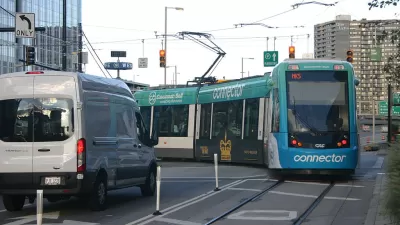Transit advocates aren't happy after a promised sales tax levy vote to raise revenue for the Cincinnati Metro transit system was nixed from the fall ballot.

The Board of Trustees of the Southwest Ohio Regional Transit Authority (SORTA) voted last week not to place a countywide sales tax levy on the ballot this fall to fund the Cincinnati Metro system, according to an article by Hannah Sperling.
After the vote, Board Chair Kreg Keesee said SORTA will likely have to raise fares and cut service for the Metro system as a result, but the board could not reach consensus on a levy for the fall ballot. "I do not believe that the current environment provides a clear path to victory at the polls even if consensus had been reached," wrote Keesee in a statement quoted by Sperling in the article.
The fallout from the decision has hit transit advocates hard. A follow up article by Sperling says the board received a tongue lashing the day after the decision. Better Bus Coalition President Cam Hardy told the board they should delete their mission statement, which targets 20 million rides a year by 2021, according to Sperling.
Also expressing disappointment in the decision is Neil Kelly, an opinion contributor writing for the Cincinnati Enquirer, who says, "without a robust Metro system, I am screwed."
To many of you reading this, Metro may seem like a burden to your wallets every year. But to me, Metro means freedom and independence. That's why I was excited to advocate to anybody that would listen to vote for a Metro tax levy to give me even more freedom.
Now, to be blunt, to call me disappointed and disheartened in the SORTA Board is an understatement. I don't care about political realities. I don't care about internal polls. And I don't care that Metro, as Hoffmeister quipped, doesn't "have a Fiona to help us pass this."
I care about rate increases. I care about cuts to routes. I care about the sustainability of my reliable transportation to work. I care about my freedom.
FULL STORY: Cincinnati Metro: No bus levy vote this fall. Service cuts, fare increases likely.

Planetizen Federal Action Tracker
A weekly monitor of how Trump’s orders and actions are impacting planners and planning in America.

Maui's Vacation Rental Debate Turns Ugly
Verbal attacks, misinformation campaigns and fistfights plague a high-stakes debate to convert thousands of vacation rentals into long-term housing.

Restaurant Patios Were a Pandemic Win — Why Were They so Hard to Keep?
Social distancing requirements and changes in travel patterns prompted cities to pilot new uses for street and sidewalk space. Then it got complicated.

In California Battle of Housing vs. Environment, Housing Just Won
A new state law significantly limits the power of CEQA, an environmental review law that served as a powerful tool for blocking new development.

Boulder Eliminates Parking Minimums Citywide
Officials estimate the cost of building a single underground parking space at up to $100,000.

Orange County, Florida Adopts Largest US “Sprawl Repair” Code
The ‘Orange Code’ seeks to rectify decades of sprawl-inducing, car-oriented development.
Urban Design for Planners 1: Software Tools
This six-course series explores essential urban design concepts using open source software and equips planners with the tools they need to participate fully in the urban design process.
Planning for Universal Design
Learn the tools for implementing Universal Design in planning regulations.
Heyer Gruel & Associates PA
JM Goldson LLC
Custer County Colorado
City of Camden Redevelopment Agency
City of Astoria
Transportation Research & Education Center (TREC) at Portland State University
Jefferson Parish Government
Camden Redevelopment Agency
City of Claremont




























